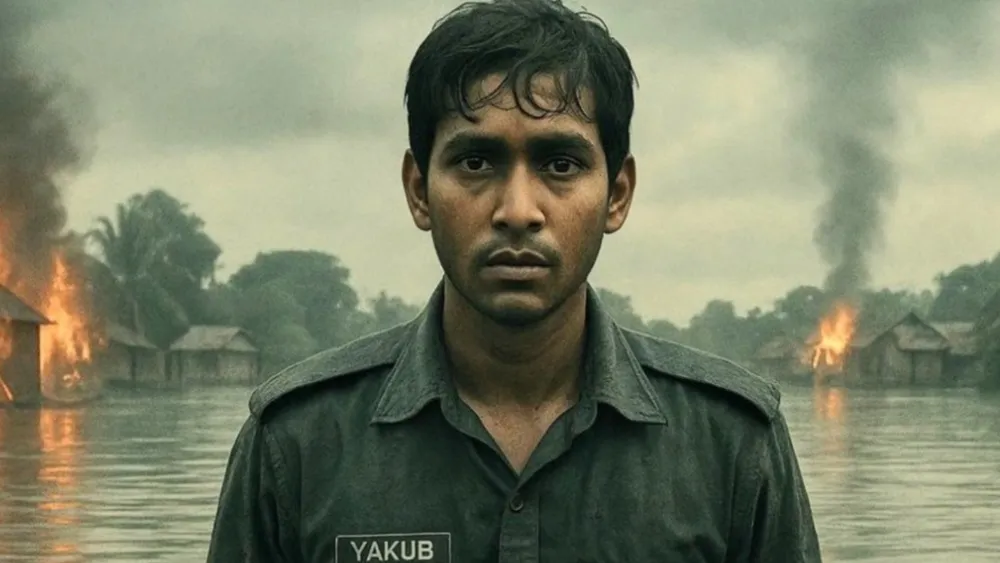
Bangladesh filmmaker Abu Shahed Emon‘s passion project “A Foolish Man” is finally moving toward production after more than a decade in development, with Taiwan’s Flash Forward Entertainment coming aboard as an international co-production partner.
The film follows Yakub, who always dreamed of becoming a policeman but finds his long-awaited freedom comes at a brutal cost when he accidentally escapes death row during a dictatorship’s fall. In a lawless nation where police are hunted and justice no longer exists, the badge he once worshipped may become the very reason he dies.
For Emon, the project represents deeply personal terrain. “‘A Foolish Man’ is not a film I chose to make — it’s a film that has lived inside me for over a decade,” the director says. “Since writing the first draft in 2011, it has followed me like a quiet shadow, refusing to leave. What started as a simple story about a man mocked for his name has transformed into something much deeper: a meditation on legacy, shame, and the burden of identity within a broken system.”
The project first gained international recognition in 2011 when it received the Asian Cinema Fund for development and was selected for the Asian Project Market. At APM, it also won the Göteborg Film Festival Fund, marking an impressive beginning and drawing strong international attention.
However, the project was set aside as Emon focused on his debut feature “Jalal’s Story” (2014), which became the first Bangladeshi film ever to compete in Busan’s New Currents Competition and later represented Bangladesh as its official Oscar submission in 2016. During this period, Emon was also pursuing studies at the Korea National University of Arts.
“A Foolish Man” resurfaced in 2016 when it was selected for Film Bazaar in India and participated in the Open Doors Lab at the Locarno International Film Festival. Despite gaining significant momentum and further script development, the film remained unproduced due to Emon’s growing commitments as a filmmaker and producer, and later the disruptions of COVID-19.
In the intervening years, Emon established himself as one of Bangladesh’s leading independent voices. His three major works—”Jalal’s Story” (2014), “Sincerely Yours, Dhaka” (2018), and “No Ground Beneath the Feet” (2021) – all represented Bangladesh at the Oscars in 2016, 2020, and 2023, respectively. The latter two projects were produced by Emon and bowed at Busan. He also directed the acclaimed web series “Mercules” (2023) and built a remarkable producing career.
The story’s contemporary relevance became particularly clear to Emon following recent political upheavals. “In 2024, when the Bangladeshi government fell, I watched television in disbelief,” he said. “I saw images that echoed the world I had imagined years ago — empty police stations, civilians maintaining order, chaos and silence in equal measure. I realized then: ‘A Foolish Man’ is not a past drama anymore. It is a contemporary tragedy.”
Veteran producer Patrick Mao Huang of Flash Forward Entertainment has had films selected by festivals worldwide including Cannes, Venice, Berlinale, Toronto, Busan, Rotterdam, Tribeca, Nantes, Shanghai, Edinburgh, Hong Kong, Taipei Golden Horse Film Festivals, and won numerous awards. He had three films at the 2024 Busan International Film Festival, including Hu Zhaoxiang’s “As the River Goes By,” Nelicia Low’s Karlovy Vary winner “Pierce,” and Amanda Nell Eu’s Cannes winner “Tiger Stripes.”
Huang encountered the project again when Emon pitched it at the Red Sea International Film Festival in November 2024. “At first, I hesitated – I was already attached to several South Asian projects,” Huang said. “But once I read the script, I immediately understood why this story has stayed alive for so long.”
Huang noted that while the central idea has remained intact since its inception, Emon has contemporized certain settings to give the film freshness for today’s audiences. “The shifting political and social landscape in Bangladesh – and in South Asia more broadly – has only made the story more resonant,” he added. “At a time when questions of class, power, and justice dominate global discourse, this is exactly the kind of film that demands to be made.”



